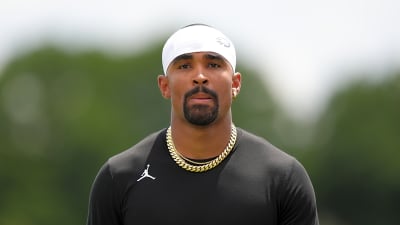
The Houston Rockets' multi-year rebuild proved fruitful, as it pertains to constructing a title-contending roster. The level of talent catapulted them to second in the Western Conference.
They hadn't even sniffed the play-in tournament, let alone the playoffs, for nearly half a decade prior.
The stockpile of up-and-coming talent was undeniable.
The problem? It created a logjam.
Not everyone can get minutes. Especially in Ime Udoka's rotation.
These weren't the Stephen Silas days, where everyone was guaranteed playing time.
Although Silas's starting lineup decisions were questionable --i.e. starting Bruno Fernando over Alperen Sengun.
Udoka is going to make you earn your minutes, and prove yourself capable of playing the right way. Basketball isn't just about scoring.
Not in Udoka's eyes, anyways. He, perhaps, prioritizes the other end more.
This was best exhibited by his handling of Cam Whitmore, the ultra-talented scoring wing (who would've thrived under Silas).
Whitmore came close to averaging a point per minute as a rookie (12.3 points in 18.7 minutes), yet he struggled to land a considerable role. In fact, he played 30 minutes or more just twice that season.
He played even less the following season -- at 16.2 minutes.
For what it's worth, Whitmore admitted to the media that he didn't think he'd done enough to warrant more playing time. Sure, players make such comments in jest quite regularly, seeking to say the right things and not upset their bosses, but it was clear that Whitmore was a capable NBA-level player.
Unsurprisingly, Houston moved him this offseason, paving the way for a much more significant role on the rebuilding Washington Wizards.
The deal found its way on Bleacher Report's "most lopsided" offseason trades list. The writer, Daniel Favale gave his reasoning.
"The Rockets had no clear path to offer Whitmore playing time following the additions of Kevin Durant and Dorian Finney-Smith. His value already dipped along with his minutes last season, so trading him was the prudent move.
Nabbing a pair of second-rounders from two of the NBA's most inept franchises considerably softens the blow. But punting on Whitmore's scoring upside when he has two years left on his rookie-scale contract without receiving first-round compensation cannot be declared a win.
The victory belongs to the Wizards. They remain in talent-acquisition mode and just picked up a 6'7" wing averaging over 20 points per 36 minutes through his first two seasons. That's a flier on which any rebuilding squad would pounce. And it won't ever cost Washington a top-30 pick."
Favale's description of the franchise "punting on Whitmore's scoring upside" is the issue here. The Rockets wanted Whitmore to do more than just put the ball in the hoop.
Also, the return wasn't exactly important to the franchise, as they saw the move as an opportunity to do right by Whitmore and let him blossom elsewhere, at the destination of his choice.
That should be considered a win by all parties.
More must-reads:
- Ben Simmons reportedly made shocking Knicks decision
- Kevin Love reportedly unlikely to open season with Jazz
- The 'Longest receptions of the 2024 NFL season' quiz
Breaking News
Trending News
Customize Your Newsletter
 +
+
Get the latest news and rumors, customized to your favorite sports and teams. Emailed daily. Always free!








